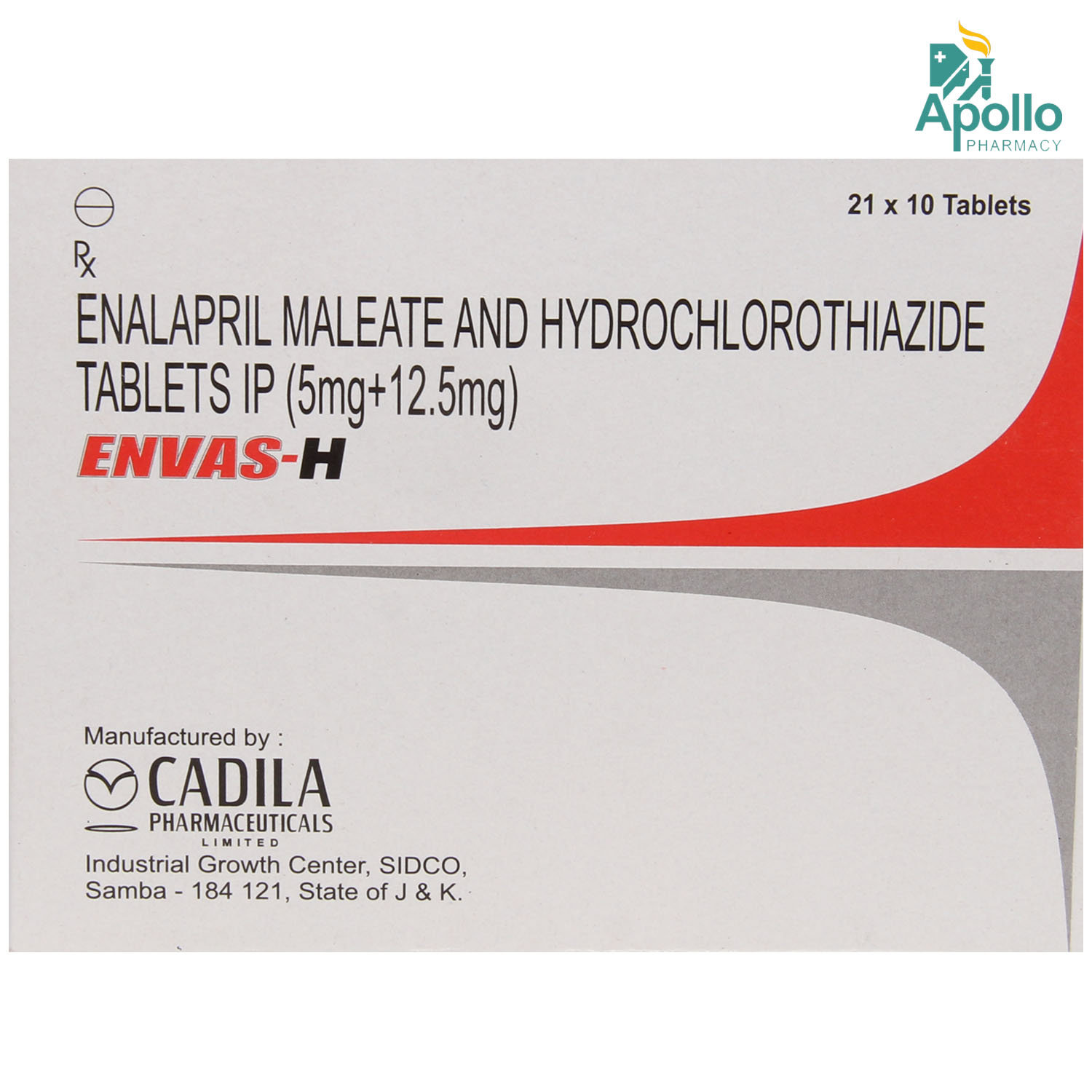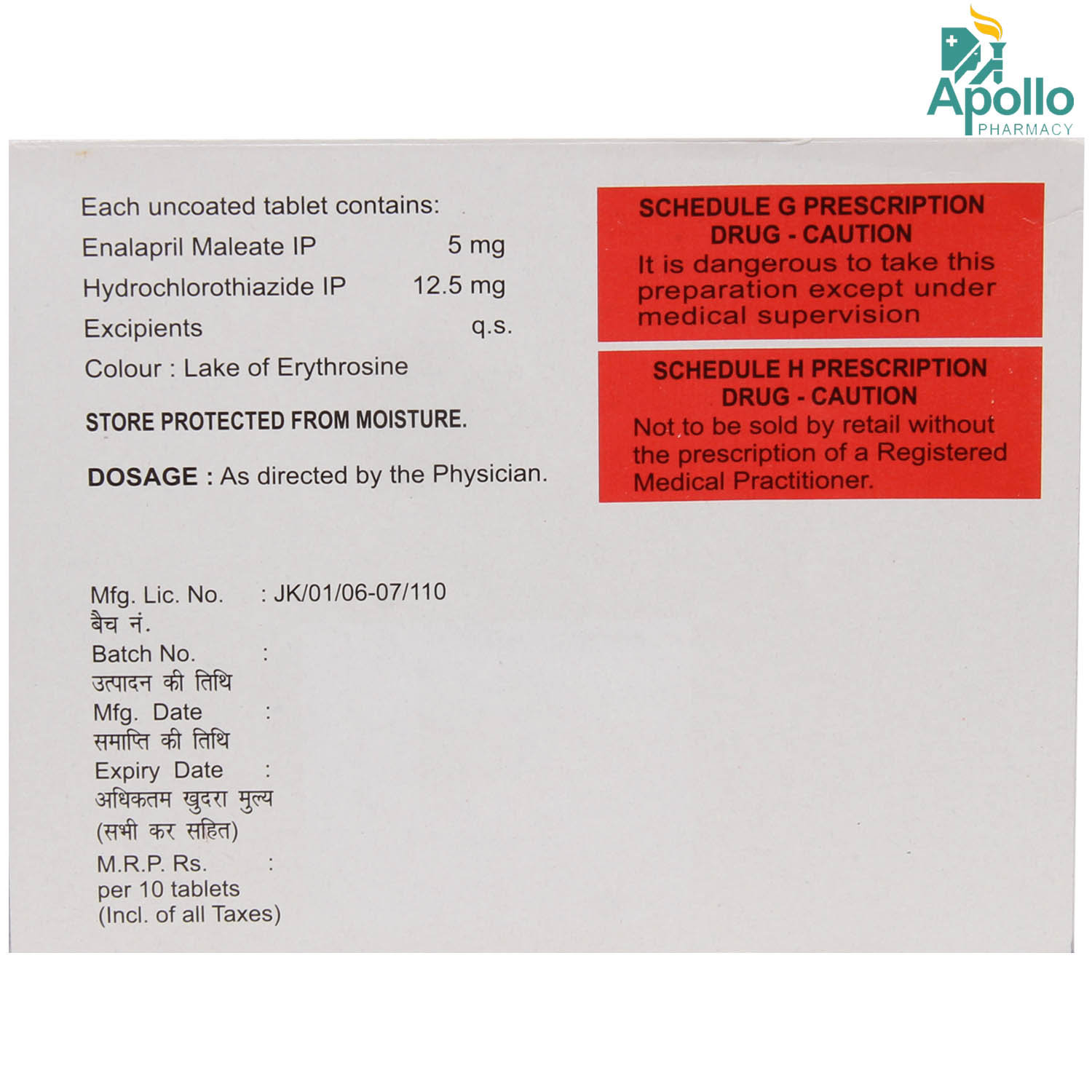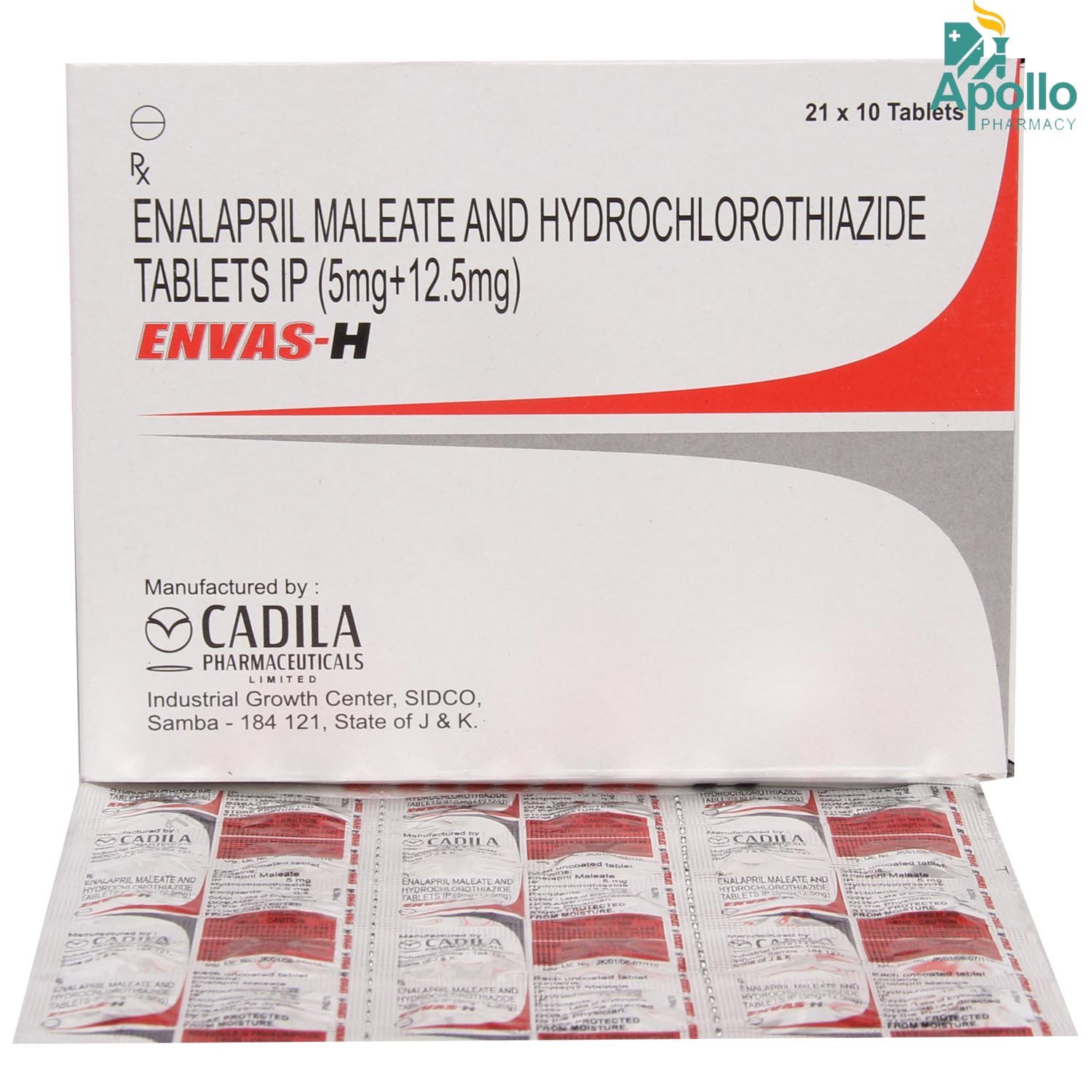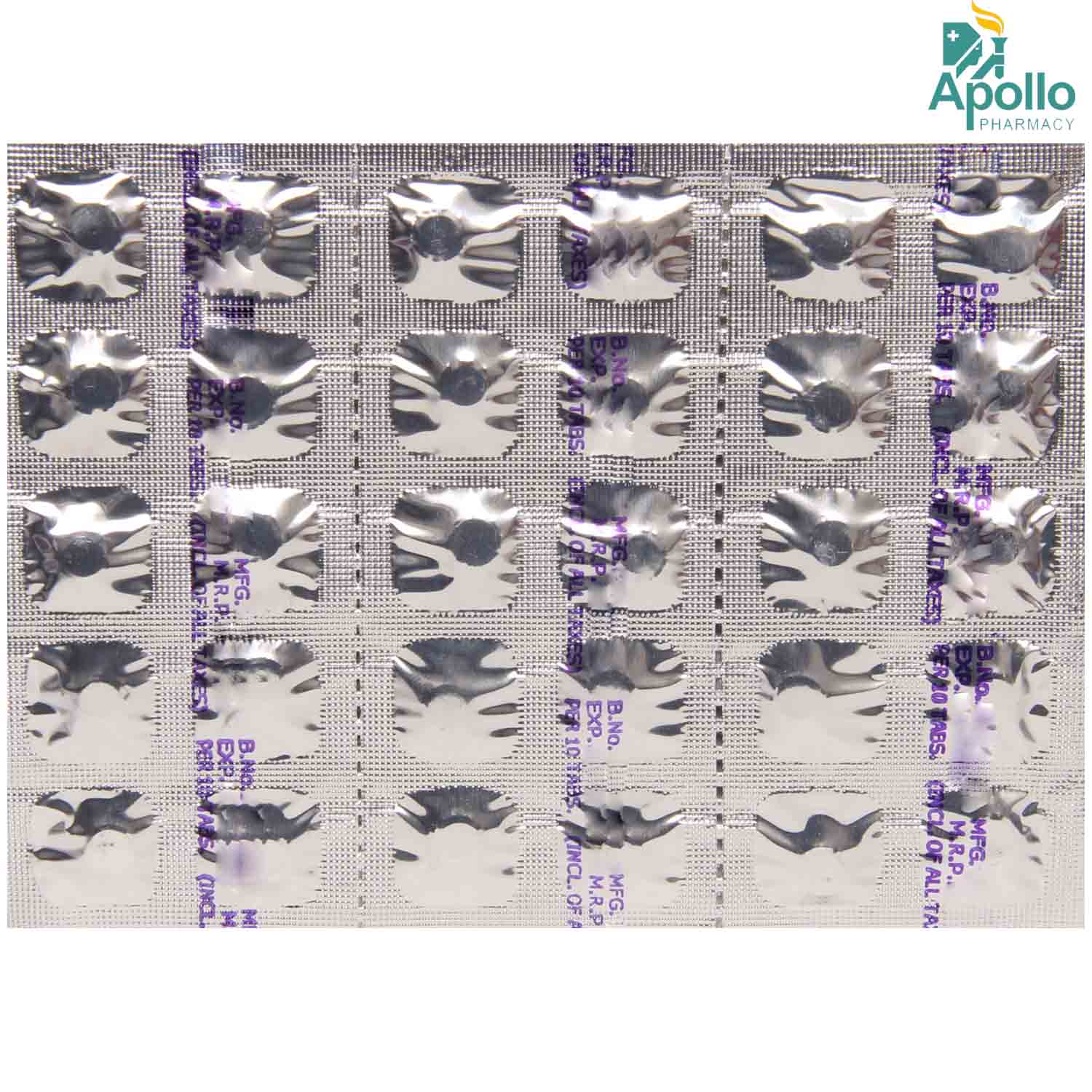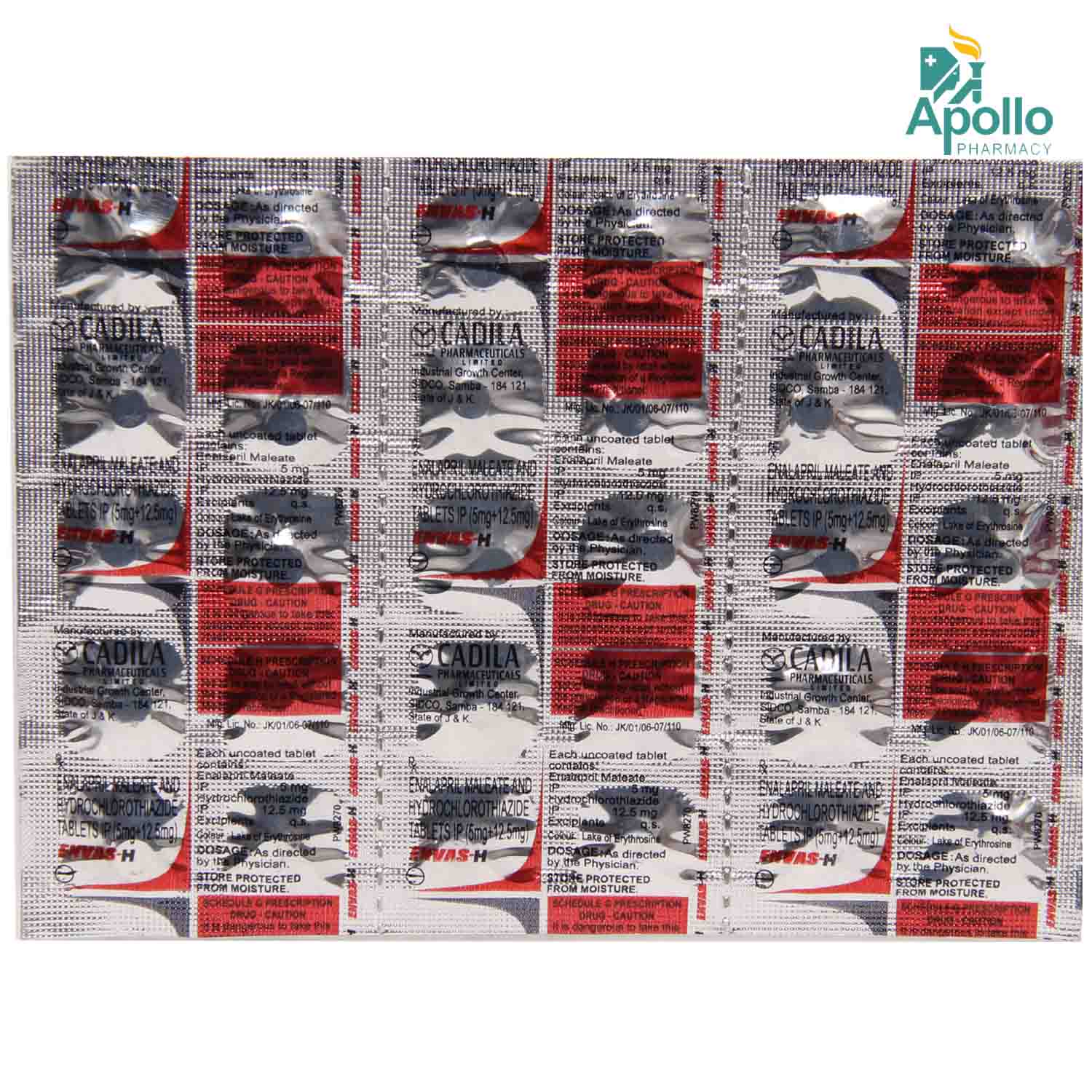Envas-H Tablet 10's
MRP ₹106.5
(Inclusive of all Taxes)
₹16.0 Cashback (15%)
Provide Delivery Location
Online payment accepted
 Prescription drug
Prescription drugWhats That
 15 people bought
15 people bought Composition :
Manufacturer/Marketer :
Consume Type :
Expires on or after :
Return Policy :
About Envas-H Tablet
Envas-H Tablet belongs to a class of medication called 'anti-hypertensive' primarily used to treat hypertension (high blood pressure). Hypertension is a condition in which the force exerted by the blood against the artery walls becomes so high that it causes health problems, such as heart disease.
Envas-H Tablet is a combination of two drugs: Enalapril (angiotensin-converting enzyme inhibitor) and Hydrochlorothiazide (diuretic). Enalapril belongs to the class angiotensin-converting enzyme (ACE) inhibitors that work by blocking an angiotensin-converting enzyme which decreases the production of angiotensin II in the body that causes constriction and narrowing of blood vessels leading to high blood pressure. Thereby, it widens and relaxes blood vessels. Hydrochlorothiazide belongs to diuretics (water tablets) that work by increasing the removal of excess water and certain salts such as sodium and potassium from the blood. This removal of water from blood reduces the fluid volume circulating through blood vessels. Thus, together they lower high blood pressure.
Take Envas-H Tablet as prescribed. Your doctor will advise you on how often you take your tablets based on your medical condition. In some cases, you may experience dizziness, weakness, blurred vision, nausea, headache, orthostatic hypotension (low blood pressure when standing up from sitting or lying position), high cholesterol or uric acid levels, electrolyte imbalance, diarrhoea, chest pain, fast heartbeat, changes in taste or stomach pain. Most of these side effects of Envas-H Tablet do not require medical attention and gradually resolve over time. However, if the side effects persist, please consult your doctor.
Envas-H Tablet is not recommended for pregnant women, especially in second and third trimesters as it may cause serious harm to the baby. Therefore, pregnant or breastfeeding women are advised to consult a doctor before taking Envas-H Tablet . Avoid potassium supplements with Envas-H Tablet as it may lead to high potassium levels in the blood. If you have asthma, diabetes, low blood pressure, difficulty in urination, gout, blood disorders, systemic lupus erythematosus (an autoimmune disease), scleroderma (hardening and tightening of skin), cerebrovascular disease (a condition affecting blood flow to the brain), have a history of angioedema (swelling under the skin) or skin cancer, kidney, liver or heart problems inform your doctor before taking Envas-H Tablet .
Uses of Envas-H Tablet
Directions for Use
Key Benefits
Envas-H Tablet is a combination of two drugs, namely: Enalapril and Hydrochlorothiazide. Enalapril belongs to the class angiotensin-converting enzyme (ACE) inhibitors that work by blocking an angiotensin-converting enzyme which decreases the production of angiotensin II in the body causes constriction and narrowing of blood vessels leading to high blood pressure. Thereby, it widens and relaxes blood vessels. Hydrochlorothiazide is a diuretic (water tablet) that increases the removal of excess water and certain salts such as sodium and potassium from the blood. This removal of water from blood reduces the fluid volume circulating through blood vessels. Thus, together they lower high blood pressure.
Storage
- Reduce salt intake to minimize fluid buildup.
- Use compression stockings, sleeves, or gloves.
- Gently massage the affected area towards the heart.
- Protect the swollen area from injury and keep it clean.
- Use lotion or cream to keep the skin moisturized.
Drug Warnings
If you are known to be allergic to Envas-H Tablet or any other medicines, please tell your doctor. Envas-H Tablet is not recommended for pregnant women, especially in second and third trimesters as it may cause serious harm to the baby. Therefore, pregnant or breastfeeding women are advised to consult a doctor before taking Envas-H Tablet . It is advised to complete the full course of medication and do not suddenly stop taking Envas-H Tablet as it may cause recurring symptoms or worsen the condition. Avoid potassium supplements with Envas-H Tablet as it may lead to high potassium levels in the blood. If you are about to under any surgery, receive anesthetics, LDL apheresis treatment (cholesterol removal from blood using a machine), or desensitization treatment, inform your doctor that you are taking Envas-H Tablet . If you have asthma, diabetes, low blood pressure, difficulty in urination, gout, blood disorders, systemic lupus erythematosus (an autoimmune disease), scleroderma (hardening and tightening of skin), cerebrovascular disease (a condition affecting blood flow to the brain), have a history of angioedema (swelling under the skin) or skin cancer, kidney, liver or heart problems inform your doctor before taking Envas-H Tablet .
Drug-Drug Interactions
Drug-Drug Interactions
Login/Sign Up
Using aliskiren together with Envas-H Tablet may increase the risk of serious side effects such as kidney problems, low blood pressure, and high potassium levels in the blood.
How to manage the interaction:
Taking Envas-H Tablet with aliskiren is not recommended, but it can be taken together if your doctor advises. However, contact your doctor if you experience nausea, vomiting, weakness, confusion, tingling of the hands and feet, or feelings of heaviness in the legs. Do not stop taking any medications without consulting a doctor.
Taking Cisapride and Envas-H Tablet can increase the risk of an irregular heart rhythm which can be severe. The risk increases in patients with a history of heart illness or electrolyte imbalance.
How to manage the interaction:
Combining Cisapride and Envas-H Tablet together is generally avoided as it can possibly result in an interaction, it can be taken if advised by your doctor. However, if you experience any symptoms like dizziness, lightheadedness, fainting, or fast or pounding heartbeats, consult the doctor immediately. Do not stop using any medications without a doctor's advice.
Taking Dofetilide and Envas-H Tablet can increase the risk of an irregular heart rhythm which can be severe. The risk increases in patients with a history of heart illness or electrolyte imbalance.
How to manage the interaction:
Combining Dofetilide and Envas-H Tablet together is not recommended as it can possibly result in an interaction, it can be taken if advised by your doctor. However, if you experience any symptoms like sudden dizziness, lightheadedness, fainting, shortness of breath, chest pain or tightness, rapid heartbeat, or memory loss, contact your doctor immediately. Do not discontinue any medications without consulting a doctor.
Taking potassium citrate with Envas-H Tablet may increase potassium levels in the blood, leading to kidney problems, muscle paralysis, and abnormal heart rhythm.
How to manage the interaction:
Co-administration of Envas-H Tablet with Potassium citrate can result in an interaction, but it can be taken if your doctor has advised it. However, consult the doctor if you experience nausea, vomiting, weakness, confusion, tingling of the hands and feet, and feelings of heaviness in the legs. Do not discontinue any medications without a doctor's advice.
Envas-H Tablet combined with Trimethoprim can cause hyperkalemia by elevating blood potassium levels. In severe cases, hyperkalemia can induce muscle paralysis, renal damage, and cardiac problems. The risk is increased if you are elderly, dehydrated, or have a history of renal or cardiovascular disease.
How to manage the interaction:
Although taking Envas-H Tablet together with Trimethoprim may possibly result in an interaction, they can be taken together if prescribed by your doctor. However, contact your doctor immediately if you experience signs and symptoms of hyperkalemia, such as nausea, vomiting, confusion, numbness, tingling in hands and feet, and irregular heartbeat. It is advised to limit the intake of potassium-rich foods like tomatoes, bananas, mangoes, beans, and potassium-containing supplements. Do not discontinue any medication without consulting your doctor.
When mipomersen is used with other drugs that can potentially damage the liver, like Envas-H Tablet, the risk of liver issues increases.
How to manage the interaction:
Although taking Envas-H Tablet and Mipomersen together can cause an interaction, it can be taken if your doctor has suggested it. If you have any of these symptoms - joint pain, swelling, skin rash, itching, fatigue, abdominal pain, or dark urine - immediately contact your doctor. Do not stop using any medications without a doctor's advice.
Due to additive or synergistic effects, coadministration of Envas-H Tablet with candesartan may raise the risk of hyperkalemia, hypotension, syncope, and renal failure. The risk is increased if you are elderly, dehydrated, or have a history of kidney or heart disease.
How to manage the interaction:
Although taking Envas-H Tablet together with Candesartan may result in an interaction, they can be taken together if prescribed by your doctor. However, contact your doctor immediately if you experience signs and symptoms of hyperkalemia, such as nausea, vomiting, confusion, numbness, tingling in hands and feet, and irregular heartbeat. It is advised to limit the intake of potassium-rich foods like tomatoes, bananas, mangoes, beans and potassium-containing supplements. Do not discontinue any medication without consulting your doctor.
Taking Envas-H Tablet with Potassium citrate increases the potassium levels in the blood, which may lead to hyperkalemia. In severe cases, hyperkalemia may lead to muscular paralysis, kidney damage, and cardiac problems. The risk is increased if you are elderly, dehydrated, or have a history of kidney or heart disease.
How to manage the interaction:
Although taking Envas-H Tablet together with Potassium citrate may possibly result in an interaction, they can be taken together if prescribed by your doctor. However, contact your doctor immediately if you experience signs and symptoms of hyperkalemia, such as nausea, vomiting, confusion, numbness, tingling in hands and feet, and irregular heartbeat. It is advised to limit the intake of potassium-rich foods like tomatoes, bananas, mangoes, beans, and potassium-containing supplements. Do not discontinue any medication without consulting your doctor.
Envas-H Tablet, when taken together with Tizanidine, may lead to hypotension (low blood pressure) due to the additive effect.
How to manage the interaction:
Although taking Envas-H Tablet together with Tizanidine may possibly result in an interaction, they can be taken together if prescribed by your doctor. However, contact your doctor immediately if you experience signs and symptoms of hypotension, such as headache, dizziness, drowsiness, fainting, or irregular heartbeat. It is advised not to drive or operate any machinery that requires alertness and to be cautious when getting up from a sitting or lying position. Do not discontinue any medication without consulting your doctor.
Due to the additive effect, the coadministration of Envas-H Tablet and Amiloride (potassium-sparing diuretic) may increase blood potassium levels. The risk is increased if you are elderly, dehydrated, or have a history of kidney or heart disease.
How to manage the interaction:
Although taking Envas-H Tablet together with Allopurinol may possibly result in an interaction, they can be taken together if prescribed by your doctor. However, if you experience any signs and symptoms of hyperkalemia like, weakness, confusion, numbness or tingling, and uneven heartbeats, consult your doctor immediately. Do not discontinue any medication without consulting your doctor.
Drug-Food Interactions
Drug-Food Interactions
Login/Sign Up
Lentils, Orange Juice, Oranges, Raisins, Potatoes, Salmon Dried, Spinach, Sweet Potatoes, Tomatoes, Coconut Water, Beans, Beetroot, Broccoli, Bananas, Apricots, Avocado, Yogurt
How to manage the interaction:
Consumption of potassium rich food while on the treatment with Envas-H Tablet can lead to weakness, confusion, numbness of tingling sensation in hands or legs, or slow or rapid heartbeat. Avoid or limit consumption of potassium rich food while on the treatment with Envas-H Tablet.
Diet & Lifestyle Advise
- Maintain a low salt diet and minimize eating processed foods as they contain more sodium. Try to replace salt with spices or herbs to add flavor to the food.
- Do regular exercise such as cycling, walking, jogging, dancing, or swimming for a minimum of 30 minutes per day.
- Chronic stress may also cause high blood pressure. Therefore, avoid stress triggers and make time for yourself to relax and do activities that you enjoy.
- Maintain a diet that is rich in vegetables, fruits, whole grains, and low-fat dairy products.
- Try to include heart-healthy omega 3 fatty acid-containing foods in your daily diet. You can also use low-fat cooking oil like olive oil, soybean oil, canola oil, and coconut oil which may help in lowering high blood pressure.
- Quit smoking and avoid the consumption of alcohol.
Side Effects of Envas-H Tablet
- Dizziness
- Weakness
- Blurred vision
- Nausea
- Headache
- Orthostatic hypotension (low blood pressure when standing up from lying or sitting position)
- High cholesterol or uric acid levels
- Electrolyte imbalance
- Diarrhoea
- Chest pain
- Fast heartbeat
- Changes in taste
- Stomach pain
Habit Forming
Therapeutic Class
All Substitutes & Brand Comparisons
RX
Out of StockEnal-H Tablet 10's
East West Pharma India Pvt Ltd
₹29.5
(₹2.66 per unit)
72% CHEAPERRX
Out of StockEnalet H 5mg/12.5mg Tablet
Ikon Remedies Pvt Ltd
₹72.5
(₹6.53 per unit)
31% CHEAPERRX
Out of StockEnace D 5 Tablet 30's
Abbott India Ltd
₹241.5
(₹7.25 per unit)
24% CHEAPER
Author Details
We provide you with authentic, trustworthy and relevant information
Drug-Diseases Interactions
Drug-Diseases Interactions
Login/Sign Up
FAQs
Drug-Drug Interactions Checker List
- ASPIRIN
- DULOXETINE
- FLUOXETINE
- SERTRALINE
- HYDROCHLOROTHIAZIDE
- FUROSEMIDE
- PREGABALIN
- METOPROLOL
- AMLODIPINE
- ALBUTEROL
- SALMETEROL
- CHOLECALCIFEROL
Special Advise
- Regular monitoring of blood pressure, kidney functioning, and amount of electrolytes such as sodium, potassium, magnesium, creatinine, and liver enzyme levels are recommended while taking Envas-H Tablet .
- If you are about to take an anti-doping test, please inform your doctor that you are taking Envas-H Tablet as it may give a positive result.
- Low salt diet and regular exercise are recommended along with Envas-H Tablet for effective results.
Disease/Condition Glossary
Hypertension: Blood pressure is the measurement of the heart's force to pump blood to all parts of the body. Hypertension is a chronic condition in which blood pressure is too high. This condition can lead to hardened arteries (blood vessels), decreasing the blood and oxygen flow to the heart. Raised blood pressure can cause chest pain (angina) and heart attack (when blood supply to the heart is blocked). Additionally, high blood pressure also causes brain damage (stroke) and kidney failure. High blood pressure can be diagnosed with the help of a blood pressure monitor or sphygmomanometer. Systolic pressure is the pressure when the heart pumps blood out. On the other hand, diastolic pressure is the pressure when your heart is at the resting stage between heartbeats. If your blood pressure is 140/90 mm of Hg, it means the systolic pressure is 140 mm of Hg and, diastolic pressure is 90 mm of Hg. Normal blood pressure lies in between 90/60 mm of Hg and 120/80 mm of Hg. If the blood pressure is 140/90 mmHg or greater, it is considered high blood pressure.

Have a query?
Alcohol
Safe if prescribed
Avoid alcohol consumption with Envas-H Tablet as it may increase the risk of low blood pressure and cause adverse effects such as dizziness, fainting, light-headedness or headache.
Pregnancy
Consult your doctor
Please consult a doctor if you are pregnant. Envas-H Tablet is not recommended for pregnant women, especially in the second and third trimesters as it may cause birth defects or serious harm to the baby.
Breast Feeding
Consult your doctor
Envas-H Tablet may be excreted in human milk. Therefore, Envas-H Tablet is not recommended for breastfeeding mothers as it may be unsafe for the baby. However, please consult a doctor.
Driving
Safe if prescribed
Envas-H Tablet may cause dizziness or tiredness in some people. Therefore, avoid driving if you feel dizzy or tired after taking Envas-H Tablet .
Liver
Consult your doctor
Envas-H Tablet should be given with caution, especially if you have a history of Liver diseases/conditions. The dose may be adjusted by your doctor as required. Avoid taking Envas-H Tablet if you have severe liver problems.
Kidney
Consult your doctor
Envas-H Tablet should be given with caution, especially if you have a history of Kidney diseases/conditions. The dose may be adjusted by your doctor as required. Avoid taking Envas-H Tablet if you have severe kidney problems.
Children
Safe if prescribed
It is not recommended for children as the safety and effectiveness were not established.

